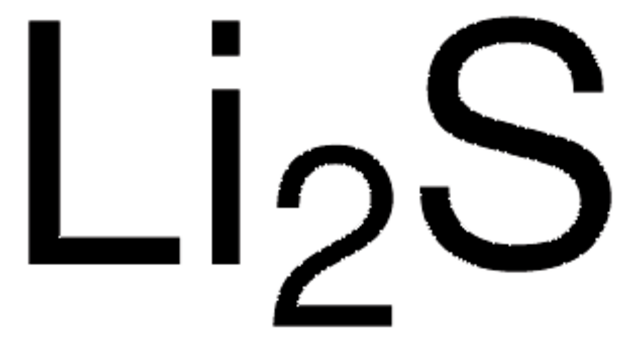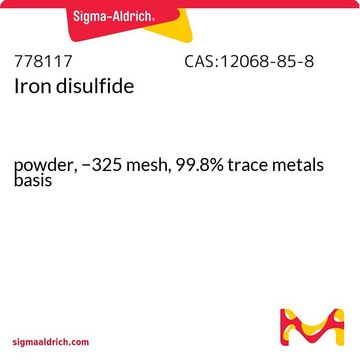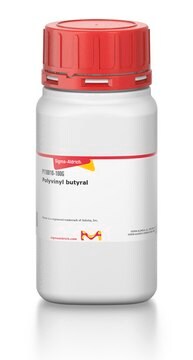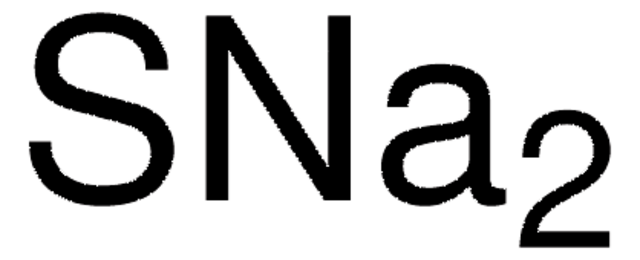342459
Copper(I) sulfide
powder, −325 mesh
Sinónimos:
Cuprous sulfide
Iniciar sesiónpara Ver la Fijación de precios por contrato y de la organización
About This Item
Fórmula empírica (notación de Hill):
Cu2S
Número de CAS:
Peso molecular:
159.16
Número CE:
Número MDL:
Código UNSPSC:
12352302
ID de la sustancia en PubChem:
NACRES:
NA.23
Productos recomendados
formulario
powder
Nivel de calidad
tamaño de partícula
−325 mesh
densidad
5.6 g/mL at 25 °C (lit.)
aplicaciones
battery manufacturing
cadena SMILES
[Cu]S[Cu]
InChI
1S/2Cu.S
Clave InChI
JESPAFKOCOFQIN-UHFFFAOYSA-N
¿Está buscando productos similares? Visita Guía de comparación de productos
Descripción general
Copper sulfide shows metal-like electrical conductivity, chemical-sensing capability and suitable characteristics for absorption of solar energy. Cu63 NMR, X ray photoelectron spectroscopy,2 copper sulfide CuS was studied in detail. Copper sulfide is a monovalent and oxidation state was determined to be 2.2
Aplicación
- Pharmacological Study on Ocfentanil: Research on the pharmacological properties of Ocfentanil, including its biochemistry and potent analgesic effects, was explored in a study where toxicology and behavioral impacts on zebrafish larvae and mice were assessed, confirming its potential for pain management applications (Bilel et al., 2023).
- Ocfentanil in Surgical Procedures: Ocfentanil′s role in surgical applications was highlighted in a study where new analytical methods were developed for its detection in biological samples, emphasizing its significance in pharmacological studies and surgical pain management (Jung et al., 2020).
- Ocfentanil Solution for Pharmacological Studies: The development and validation of a method for detecting Ocfentanil in hair samples indicate its critical role in forensic and pharmacological research, aiding in studies focused on its stability and effects within clinical settings (Allibe et al., 2021).
Envase
Packaged in poly bottles
Otras notas
may contain a slight excess of S
Código de clase de almacenamiento
11 - Combustible Solids
Clase de riesgo para el agua (WGK)
WGK 3
Punto de inflamabilidad (°F)
Not applicable
Punto de inflamabilidad (°C)
Not applicable
Equipo de protección personal
Eyeshields, Gloves, type N95 (US)
Elija entre una de las versiones más recientes:
¿Ya tiene este producto?
Encuentre la documentación para los productos que ha comprado recientemente en la Biblioteca de documentos.
Los clientes también vieron
Synthesis of copper sulfide nanorod arrays on molecular templates.
Mao G, et al.
Nano Letters, 4(2), 249-252 (2004)
Lidia Armelao et al.
Journal of nanoscience and nanotechnology, 6(2), 401-408 (2006-04-01)
A novel method for the preparation of CuS nanoparticles based on the fast nucleation of the sulphide has been developed. The particles have been synthesized by reaction of thioacetic acid with water and copper carboxylates (acetate, propionate) in the corresponding
Riccardo Narizzano et al.
The journal of physical chemistry. B, 109(33), 15798-15802 (2006-07-21)
A heterostructure formed by a conjugated polymer and semiconducting nanoparticles was produced. The conjugated polymer was synthesized by oxidative copolymerization of 3-thiopheneacetic acid and 3-hexylthiophene, thus obtaining an amphiphilic polythiophene that allows the formation of a stable polymer layer at
Yuming Guo et al.
Chemical communications (Cambridge, England), 46(20), 3493-3495 (2010-04-09)
Copper sulfide amorphous nanoparticles and nanocrystals were prepared successfully by a special process. These CuS nanoparticles could specifically and significantly induce the apoptosis and inhibit the proliferation of human cancer cells rather than normal cells. Moreover, the biological activities of
Xiangjie Bo et al.
Talanta, 81(1-2), 339-345 (2010-03-02)
A simple and facile synthetic method to incorporate copper sulfide (Cu(2)S) nanoparticles inside the mesopores of ordered mesoporous carbons (OMCs) is reported. The Cu(2)S/OMCs nanocomposite was characterized by transmission electron microscopy (TEM), X-ray diffraction (XRD), X-ray photoelectron spectroscopy (XPS), and
Nuestro equipo de científicos tiene experiencia en todas las áreas de investigación: Ciencias de la vida, Ciencia de los materiales, Síntesis química, Cromatografía, Analítica y muchas otras.
Póngase en contacto con el Servicio técnico











